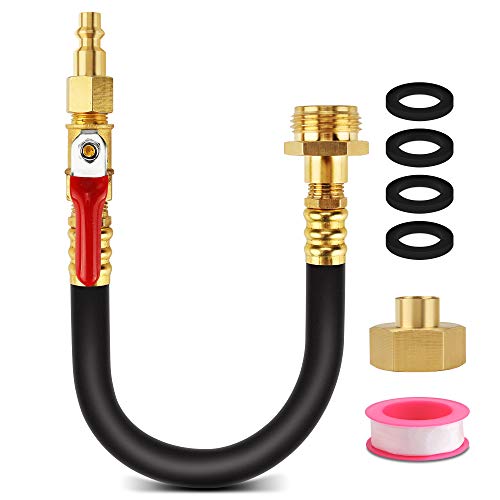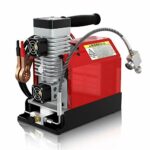
Let’s take a look at a few of the most helpful responses from experienced RVers to determine what sized air compressor is best when using the blow out method to winterize your RV. Volume – not pressure – is what you need. One of the benefits of using an air compressor to winterize your RV is that you don’t have to flush out RV antifreeze once you want to use your trailer again. Use an air compressor to blow out the remaining water, and then add RV antifreeze to be sure your stored RV is prepared for below-freezing temperatures.
Don’t connect the air compressor to the water tank on your RV. Do Connect the blow-out plug to the city water connection on your RV. If you don’t have a blow-out plug, they are available at most RV supply stores or you can build your own. Following a few simple steps using a compressor to winterize your RV system, when appropriately done, leave your piping and other system parts, free of water. If you mainly use the compressor for small jobs such as topping off the air pressure in your tires and winterizing the water system in your RV, the budget end of the compressor lineup should perform everything you want to accomplish.
There are several opinions on the size and types of air compressors that can be used to winterize a recreational vehicle. A 20-gallon air compressor can suffice to winterize a recreational vehicle. Some suggest using a 2-gallon compressor that outputs 100 PSI to the maximum level and lastly using 3 gallons of porter cable air compressor at 35 PSI. Many campers and recreational vehicle owners have recommended that the most important step to winterize RV is the combination of two procedures and that is, firstly by pumping the water pipes and then utilizing anti-freeze.
If this is your plan, make sure that you don’t forget the best air compressor for rv winterizing. The DEWALT Air Compressor 135 psi, 1 gallon Oil-Free Fully Shrouded Compressor runs a 0.75 SCFM at 135 PSI. It has a quick compressor recovery time. They are originally made for RV use, so winterizing your RV with it is no problem! Best Air Compressor for RV Winterizing Detailed ReviewsVIAIR – 40045 Automatic Function Portable Compressor Product HighlightsVIAIR – 40045 Automatic Function Portable Compressor is the first in the VIAIR’s portable compressor product line to have an automatic shutoff function.
You should see some more water drain from the water heater and hear the air entering it. With the water heater bypassed its time to blow air out of the hot water lines. Now close the warm water and open the cold water side and use your air compressor to blow out water on this side.
what size air compressor to winterize rv Related Question:
How big of an air compressor do I need to winterize my RV?
Volume – not pressure – is what you need. A 20 gallon air compressor is probably more than you’ll need to simply winterize an RV. If you’ve got one that large, it will work fine, but others use much smaller compressors.
What psi Do I need to winterize my camper?
You can use an air compressor to help blow out the water in the lines. If using an air compressor, set it to 30 psi, with a maximum air pressure of 50 psi. Also, walk around your trailer and open up the water valves one at a time when using an air compressor.
Will RV holding tanks freeze?
Having your holding tanks freeze can cause substantial damage that isn’t just a hassle to fix, it’s expensive too! The potential to freeze is largely dependent on your holding tank’s location within your rig. If they are above floor level, the ambient heat of your interior furnace will help to delay freezing.
Do you have to use antifreeze to winterize an RV?
What is this? So, antifreeze is not only used for storing an RV in cold winter climates, but also for using it. RV antifreeze is readily available, and can be used to winterize an RV that will be used for cold-weather camping.
Do you put RV antifreeze in the freshwater tank?
The RV Doctor’s Orders It can be easier to pump it backwards through a faucet spout using a backflow kit with a hand pump, but it is totally acceptable to pour the antifreeze directly into the fresh tank and use the RV’s water pump to pump it throughout the system as well.
How much RV antifreeze do I need?
Non-toxic RV antifreeze (The amount depends on the layout and length of your plumbing lines. Two to three gallons will normally do).
Can I use car antifreeze in my RV?
Ethylene Glycol Antifreeze Ethylene glycol is a very toxic component that is not safe for RVs. Typically, this chemical is seen in automotive antifreeze, and it should only be used in automobiles, not the holding tanks of recreational vehicles.
Can you leave GREY water tank open in winter?
You can leave your gray valve in the open position so water runs right down the drain. You don’t have to pay any attention to how full your gray tank is and you don’t have to dump it every few days. But there’s no chance for sewer odors to escape either. It’s the best of both worlds.
How cold is too cold for RV water lines?
As a general rule, the water in an RV’s pipes could freeze when the temperature dips below 32 degrees Fahrenheit for a day. But in many cases, it would need to get well below 30 for an extended period of time for most RV pipes to freeze.

